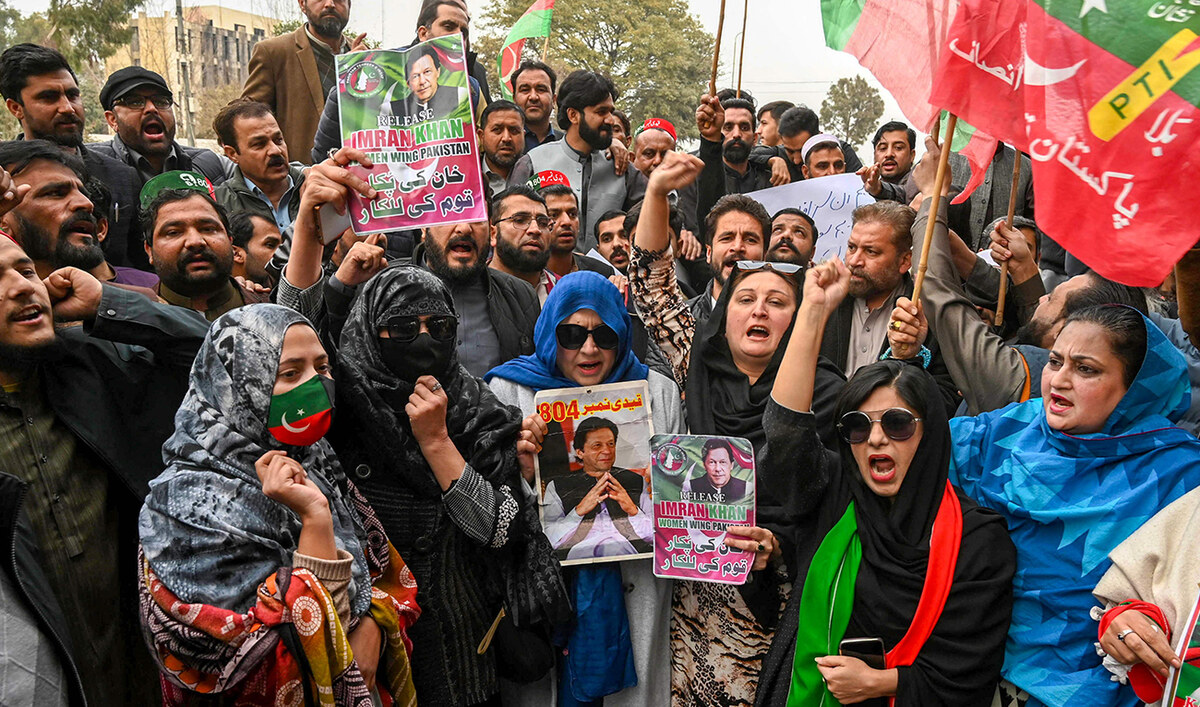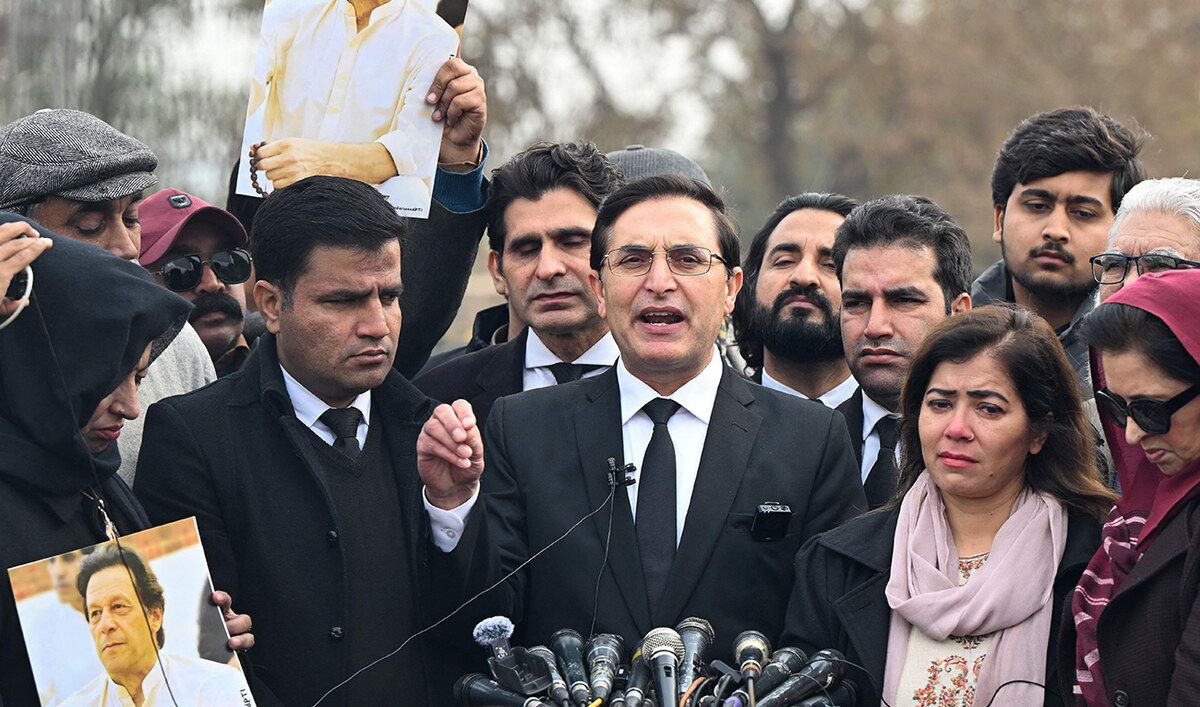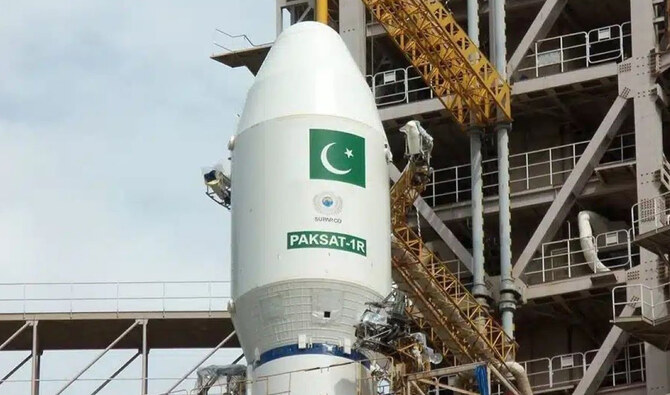ISLAMABAD: Pakistan’s first multi-mission communication satellite, PAKSAT MM1, is now fully operational, state media reported on Thursday, describing the move as a significant milestone in the country’s space and digital development.
In May, Pakistan launched the PAKSAT MM1 with Chinese assistance into space from China’s Xichang Satellite Launch Center, in a ceremony broadcast live by the Pakistan Space and Upper Atmosphere Research Commission (SUPARCO), the country’s national space agency.
The satellite has been conceived keeping in view the growing needs of the South Asian country in the broad spectrum of communication and connectivity.
“The success of PAKSAT-MM1 will transform Pakistan’s communication infrastructure, which will benefit various IT sectors,” the Radio Pakistan broadcaster reported.
“The satellite will provide services such as television broadcasting, community Internet, and tele-education to promote local industries.”
Pakistan’s ranking has improved by 14 points in the United Nations E-Governance Development Index — a comprehensive assessment tool that evaluates the digital government landscape across all UN member states — according to the state broadcaster.
The country now stands at 136 in overall ranking which was at 150 in 2022.
“This satellite will also increase Internet connectivity in remote areas which will further the government’s vision of Digital Pakistan,” the report read.
Pakistan’s first multi-mission communication satellite becomes operational
https://arab.news/yfbc3
Pakistan’s first multi-mission communication satellite becomes operational

- PAKSAT MM1 to aid in South Asian nation’s space and digital development
- The satellite will usher in digital era by providing Internet to remote areas
Authorities announce establishment of shelters ahead of possible operation in restive Pakistani district

- The announcement came a day after militants attacked a supply convoy in Kurram, killing 10 people and kidnapping five others
- Tribal and sectarian clashes since Nov. 21 have killed at least 136 people in Kurram and caused shortages of medicine, food and fuel
ISLAMABAD: Authorities in Pakistan’s Khyber Pakhtunkhwa (KP) province on Friday announced the establishment of camps for temporary displaced persons (TDPs) ahead of a possible operation in the restive Kurram district, which has been hit by deadly clashes in the last two months.
The announcement of the establishment of TDP camps came a day after militants ambushed a convoy bringing supplies to the region, killing 10 people, while there were reports of the kidnapping of another five drivers.
Kurram, a northwestern district of around 600,000 people in KP, has been rocked by tribal and sectarian clashes since November 21, when armed men attacked a convoy of Shia passengers, killing 52 people.
The attack sparked further violence and blockade of a main road connecting Kurram’s main town of Parachinar with the provincial capital of Peshawar, causing medicine, food and fuel shortages in the area, as casualties surged to 136.
“It is stated that LEAs [law enforcement agencies] is planning an operation in various areas of Lower Kurram... to counter terrorism,” the Kurram deputy commissioner’s office said in a notification on Friday.
“In order to ensure safety and support of the affected population during the expected operation, the following sites are proposed for establishment of camps for the TDPs of District Kurram,” it said, naming Government Boys Degree College, Government Technical College, Rescue 1122 Compound and Judicial Building in Tal area as the potential sites.
Feuding tribes have battled with machine guns and heavy weapons in Kurram, cutting off the remote and mountainous region bordering Afghanistan from the outside world.
Thursday’s ambush targeted a convoy of 33 vehicles set to resupply local traders in the region with rice, flour and cooking oil and two aid vehicles carrying essential medicine. It followed a similar attack on a supply convoy this month that injured five people, including a top administration official in the region.
The violence has continued despite a peace agreement signed between the warring tribes on Jan. 1. Under the peace agreement, both sides had agreed on the demolition of bunkers and the handover of heavy weapons to authorities within two weeks.
Since late last month, provincial authorities have been supplying relief goods and transporting ailing and injured people from Kurram to Peshawar via helicopters.
Pakistan, Bangladesh resolve to enhance defense cooperation amid thaw in ties

- Pakistan and Bangladesh were once one nation, but split in 1971 as a result of a bloody civil war
- Ties between both nations have warmed up since PM Hasina’s ouster due to an uprising in Aug.
ISLAMABAD: Top Pakistani and Bangladeshi officials have resolved to strengthen defense cooperation in all fields, Pakistani state media reported on Saturday, amid a thaw in relations between the two countries.
The development came at a meeting between Pakistan’s Defense Secretary Lt. Gen. (retired) Muhammad Ali and Lt. Gen. S.M. Kamr-ul-Hassan, principal staff officer of the Bangladesh armed forces division, in Rawalpindi.
The visiting dignitary expressed Bangladesh’s aspiration for “vibrant days” of cooperation between two countries, the Radio Pakistan broadcaster reported.
“The discussion was focused on expanding bilateral defense collaboration covering all domains,” the report read. “Both sides expressed satisfaction over ongoing collaboration between two countries and aimed at strengthening the cooperation in mutually beneficial fields.”
Pakistan and Bangladesh were once one nation, but they split in 1971 as a result of a bloody civil war, which saw the part previously referred to as East Pakistan seceding to form the independent nation of Bangladesh.
In the years since, Bangladeshi leaders, particularly former prime minister Hasina, chose to maintain close ties with India. Ties between Pakistan and Bangladesh have warmed up since Hasina’s ouster as a result of a student-led uprising in August, witnessing a marked improvement.
This week, Lt. Gen. Hassan met Pakistan’s Chief of Army Staff (COAS) General Asim Munir in Rawalpindi, according to the Inter-Services Public Relations (ISPR), the Pakistani military’s media wing.
During the meeting, both military commanders stressed the need for an enduring partnership between the two countries to remain “resilient against external influences.”
On Tuesday, Pakistan and Bangladesh signed a landmark agreement to establish a joint business council, the Federation of Pakistan Chambers of Commerce and Industry (FPCCI) said, amid efforts to enhance trade and economic cooperation between the two countries.
“The establishment of the Pakistan-Bangladesh Business Council is a milestone for trade relations between the two countries,” FPCCI President Atif Ikram Sheikh said after signing the agreement in Dhaka, along with representatives of the Administrative Federation of the Bangladesh Chamber of Commerce.
During the visit, the FPCCI chief led a Pakistani business delegation that held meetings with their counterparts in Bangladesh to discuss ways to enhance trade ties. The Trade Corporation of Pakistan also signed a memorandum of understanding for rice export to Bangladesh on Tuesday.
Pakistan’s Deputy Prime Minister Ishaq Dar is also scheduled to visit Dhaka in the start of February to further consolidate the relations between the two countries.
IMF projects 3 percent growth for Pakistan in 2025 amid ‘lackluster’ global outlook

- IMF’s World Economic Outlook report forecasts global growth to remain modest at 3.3 percent
- Growth projections for Pakistan in the report signal a gradual recovery after a tough period
ISLAMABAD: Pakistan’s economy is projected to grow by 3 percent in 2025, the International Monetary Fund (IMF) said in its World Economic Outlook Update released on Friday, as it painted a picture of a subdued global economy for the year ahead.
The IMF report forecasts global growth to remain modest at 3.3 percent in both 2025 and 2026, with advanced economies expected to see slower growth, while emerging markets, including Pakistan, poised to face a mixed recovery trajectory.
It warns of heightened economic policy uncertainty, particularly on trade and fiscal fronts, while mentioning that political instability in parts of Asia and Europe has rattled markets.
The report also cites geopolitical tensions in regions like the Middle East as a significant global challenge.
“Global growth is expected to remain stable, albeit lackluster. At 3.3 percent in both 2025 and 2026, the forecasts for growth are below the historical (2000–19) average of 3.7 percent,” the IMF said.
It noted in tabulated form that Pakistan’s GDP is expected to grow from 2.5 percent in 2024 to 3.0 percent in 2025 and 4.0 percent in 2026, signaling a gradual recovery after a challenging period.
The IMF’s cautious global outlook reflected structural issues and external shocks that pose risks to different world economies.
Elevated policy uncertainty, fiscal imbalances and inflationary pressures have traditionally been significant concerns for Pakistan. Additionally, global financial tightening and geopolitical tensions have further strained Pakistan’s economy in the past since it heavily relies on imports and external funding.
However, the government has been implementing structural reforms in key areas like taxation, governance and energy management, aiming to improve long-term growth prospects.
Finance Minister Muhammad Aurangzeb has consistently emphasized the importance of adhering to IMF-mandated reforms under the $7 billion loan agreement signed last year. In September, he said that “our hand has been forced as a country” to take stringent measures to put the economy back on track.
The IMF report, based on the assumption of policy continuity, reflects a cautiously optimistic trajectory for Pakistan’s economy in 2025 and beyond.
Karachi gears up for Champions Trophy with special arrangements

- Security for the tournament was discussed among senior police, Rangers and administration officials
- The authorities will run a special shuttle service between designated parking spots and the stadium
KARACHI: The administration in Karachi, set to host the inaugural match of the ICC Champions Trophy next month, announced on Friday a series of special measures to ensure the tournament's success and provide a memorable experience for spectators.
Pakistan will host the tournament from February 19 to March 9 across venues in Lahore, Islamabad and Karachi. A hybrid model has been adopted for the event, as India’s matches will be played in Dubai after it showed reluctance to play in Pakistan, citing security concerns.
A meeting to review the arrangements was held under the chairmanship of Karachi Commissioner Syed Hassan Naqvi.
“It was decided that foolproof security would be provided during the event,” said an official statement from the commissioner’s office.
“The stadium’s surroundings and routes leading to it would be decorated,” it continued. “Special parking arrangements would be made, and a shuttle service would be provided from parking spots to the stadium.”
The meeting was attended by senior officials from the police, Rangers and other relevant institutions.
Among the participants were also the director-general of the Trade Development Authority of Pakistan and representatives of the Pakistan Cricket Board (PCB).
PCB’s General Manager of the National Stadium Arshad Khan provided a detailed briefing on the tournament schedule.
The ICC Champions Trophy 2025 will feature eight teams competing in 15 matches. Group A includes Pakistan, India, New Zealand and Bangladesh, while Group B comprises South Africa, Australia, Afghanistan and England.
The opening match of the tournament will see Pakistan facing New Zealand on February 19 in Karachi.
The event is expected to strengthen Pakistan’s international cricket profile, particularly as it works to meet public expectations for hosting such a major championship.
Government says talks with Imran Khan’s party to continue despite his 14-year sentence

- Barrister Aqeel Malik, government’s legal spokesperson, calls negotiations and conviction ‘separate matters’
- An analyst predicts ‘more direct talks’ between PTI and the security establishment after the court verdict
KARACHI: A government spokesperson said on Friday political negotiations with former Prime Minister Imran Khan’s opposition Pakistan Tehreek-e-Insaf (PTI) would not be affected by an accountability court verdict earlier in the day, which sentenced the ex-premier to 14 years in prison.
Khan, who has been incarcerated for well over a year, warned of civil disobedience from a high-security prison in Rawalpindi last month while calling for the release of political prisoners from his party, which has complained of a government crackdown since the downfall of the PTI administration in April 2022.
Subsequently, the government-PTI talks began as an attempt to reduce political bitterness and polarization in Pakistan. However, the accountability court’s verdict in a case involving a charitable entity, Al-Qadir Trust, set up by Khan and his third wife Bushra Khan in 2018, has raised questions about the future of the negotiations.
The court also sentenced Khan’s wife to seven years in prison in the case. Pakistani authorities allege that the trust was a front for the couple to receive valuable land as a bribe from real estate developer Malik Riaz Hussain, one of Pakistan’s richest and most powerful businessmen. Hussain, like Khan and Bushra, denies any wrongdoing.
“The talks are going on in parallel,” Barrister Aqeel Malik, government spokesperson for legal affairs, told Arab News over the phone. “These are two separate matters. The decision from the court should not be mixed with the ongoing talks with the opposition at this particular time.”
Malik argued that the case was decided in accordance with the legal provisions of the accountability laws.
“Today’s decision is in accordance with the law and justice has been served, where a huge loss had been caused to the national exchequer for private gains,” he added. “It has now been decided by the competent court that Mr. Khan stands certified to have been involved in corruption.”

The Al-Qadir Trust case, involving allegations of corruption and misuse of authority by Khan, revolved around £190 million recovered from the Pakistani real estate tycoon, who was investigated by British authorities for money laundering.
Riaz surrendered the amount as part of a settlement, which was returned to the Pakistani state under the laws of the United Kingdom. However, the Khan administration allegedly adjusted it against the real estate developer’s liability in Pakistan’s top court, where he was fined in a case for illegally acquiring land for a major project in Karachi.
The ex-premier was criticized for using the sum to reduce Riaz’s owed amount rather than depositing it in Pakistan’s national treasury. The country’s anti-graft National Accountability Bureau also accused him of approving the adjustment in return for financial benefits.
Unlike Malik, Khan’s close aide and senior PTI leader, Sayed Zulfikar Bukhari, described the talks as a political ploy by the government.
“Talks were just a bluff,” he told Arab News, adding that it was “obvious” the PTI founding leader and his wife would be sentenced in the case.
“Al-Qadir Trust is a nonprofit organization. Neither of them was a beneficiary, and the money had gone to the Supreme Court of Pakistan,” he continued, describing the verdict as another act of “political victimization and a pressure tactic to make Khan agree to talks.”
The former premier’s conviction has come at a time when the PTI confirmed meetings with Pakistan’s powerful army chief, General Asim Munir, earlier this week, although security sources denied that the interaction focused on political matters.

Nadia Naqi, a talk show host and political analyst, said the verdict could pave the way for “more direct talks with the security establishment” of Pakistan, which she said was always interested in negotiating with a weaker Khan.
“Negotiations now, which have taken place within political circles, will become easier because a weak Imran Khan, a convicted Imran Khan, will be more likely to agree to the terms [offered to him] compared to a Khan who has obtained bail in various cases,” she argued.
“I believe that negotiations with the PTI will now move forward. Whether the government is involved or not, it won’t matter,” she added.
Iftikhar Ahmed, a Lahore-based analyst, said the future of the talks would depend on the reactions of both the government and the PTI.
“Until now, the PTI has not announced that they are ending the negotiations,” he noted. “The party did not offer this as a condition for negotiations that the courts should not announce their verdicts against Khan. Their demand was the release of the founder of their party.”
Meanwhile, Aitzaz Ahsan, a veteran lawyer and politician, maintained that the judgment against Khan had legal loopholes.
“This is another case in which the conviction will be converted into an acquittal by a high court,” he said, adding that the government had to show the state had suffered a financial loss due to Khan’s decision about the repatriated money, pointing out this was not adequately done.












